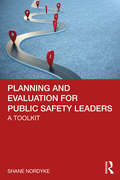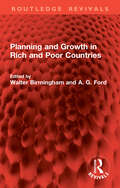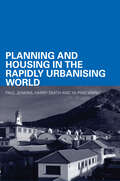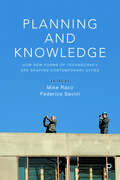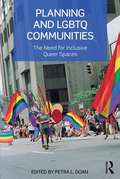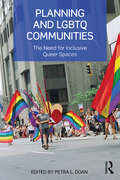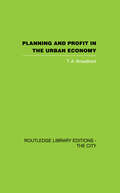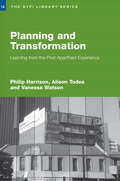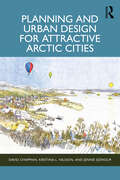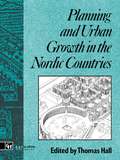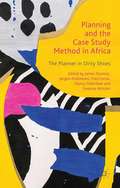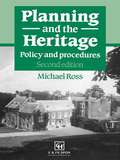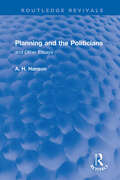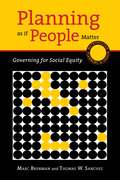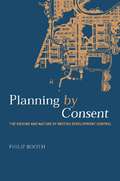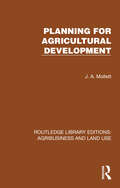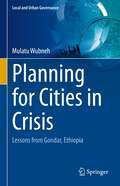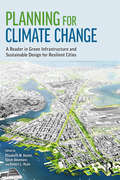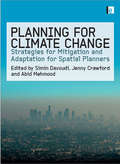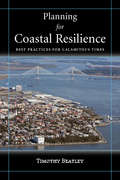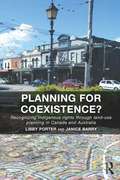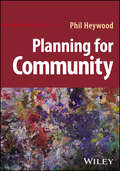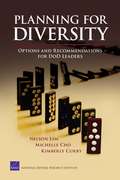- Table View
- List View
Planning and Evaluation for Public Safety Leaders: A Toolkit
by Shane NordykePlanning and Evaluation for Public Safety Leaders presents field-tested techniques and tips to help public safety leaders effectively manage their organizations and overcome challenges. Organizations and agencies operating within the public safety sector are unique in many respects. These unique elements provide a different context in which planning, and performance measurement occur. Without recognizing this particular context, most public planning texts ignore crucial pieces of the puzzle when it comes to effectively achieving and measuring public safety outcomes. This book’s practical approach equips students with approachable explanations specific to the public safety context, and practical tools for public safety leaders that can apply to their organizations. Key Features • Each chapter begins with a real-world case from the public safety sector that highlights the importance or possible application of the information covered. • Cases are written in close coordination with the public safety practitioners to illustrate how the concepts covered in the chapter work in a real-world public safety context. • "Put it into Practice" Reflections at the end of each chapter allow new or future public safety leaders to apply the material directly to their current organization. • Boxes describe how to use and apply specific methods in a concise and easy to find tools addressing planning and evaluation challenges as they arise • Key terms and application questions written specifically for students, focus in on the most important concepts and terms from the text. • Overviews of relevant theoretical and scholarly work on the concepts offer connections with course material.
Planning and Growth in Rich and Poor Countries (Routledge Revivals)
by A. G. Ford Walter BirminghamOriginally published in 1966, this book was written at a time when economists realized that rapid growth in developing nations could not be achieved without comprehensive planning and that no economy could be left to grow of its own accord without the danger of major fluctuations in economic activity and long periods of stagnation. Written by a team of academic economists who combined specialized knowledge of the theory of economic growth with world-wide experience of its practical applications, this volume provides an intelligent analysis of the problems of economic growth which faced nations that had embarked on the planning of their economies such as the UK, India, Ghana, Sierra Leone and New Zealand.
Planning and Housing in the Rapidly Urbanising World (Housing, Planning and Design Series)
by Harry Smith Paul Jenkins Ya Ping WangWritten specifically as a teaching text and authored by a team of leading academics in the field, this is the first book to bring together the key issues of rapid urbanisation with approaches to planning and housing. Outlining and explaining core concepts from ‘informal settlements’ to ‘sustainability’, it focuses on the rapid urbanization of developing countries with case studies from Latin America, Asia and Sub-Saharan Africa. The impact of rapid urbanization and associated globalization on land-use and housing is described and analyzed with reference to the particular issues of poverty, health and the environment of these areas. Providing an accessible introduction to the key issues as well as enhancing current theoretical debates and exploring practical applications, this book is an essential resource for students and researchers in this area.
Planning and Knowledge: How New Forms of Technocracy Are Shaping Contemporary Cities
by Mike Raco and Federico SaviniThis book uses an international perspective and draws on a wide range of new conceptual and empirical material to examine the sources of conflict and cooperation within the different landscapes of knowledge that are driving contemporary urban change. Based on the premise that historically-established systems of regulation and control are being subject to unprecedented pressures, scholars critically reflect on the changing role of planning and governance in sustainable urban development, looking at how a shift in power relations between expert and local cultures in western planning processes has blurred the traditional boundaries between public, private, and voluntary sectors.
Planning and LGBTQ Communities: The Need for Inclusive Queer Spaces
by Petra L. DoanAlthough the last decade has seen steady progress towards wider acceptance of lesbian, gay, bisexual, transgendered, and queer (LGBTQ) individuals, LGBTQ residential and commercial areas have come under increasing pressure from gentrification and redevelopment initiatives. As a result many of these neighborhoods are losing their special character as safe havens for sexual and gender minorities. Urban planners and municipal officials have sometimes ignored the transformation of these neighborhoods and at other times been complicit in these changes. <p><p> Planning and LGBTQ Communities brings together experienced planners, administrators, and researchers in the fields of planning and geography to reflect on the evolution of urban neighborhoods in which LGBTQ populations live, work, and play. The authors examine a variety of LGBTQ residential and commercial areas to highlight policy and planning links to the development of these neighborhoods. Each chapter explores a particular urban context and asks how the field of planning has enabled, facilitated, and/or neglected the specialized and diverse needs of the LGBTQ population. <p> A central theme of this book is that urban planners need to think "beyond queer space" because LGBTQ populations are more diverse and dispersed than the white gay male populations that created many of the most visible gayborhoods. The authors provide practical guidance for cities and citizens seeking to strengthen neighborhoods that have an explicit LGBTQ focus as well as other areas that are LGBTQ-friendly. They also encourage broader awareness of the needs of this marginalized population and the need to establish more formal linkages between municipal government and a range of LGBTQ groups. Planning and LGBTQ Communities also adds useful material for graduate level courses in planning theory, urban and regional theory, planning for multicultural cities, urban geography, and geographies of gender and sexuality.
Planning and LGBTQ Communities: The Need for Inclusive Queer Spaces
by Petra L. DoanAlthough the last decade has seen steady progress towards wider acceptance of lesbian, gay, bisexual, transgendered, and queer (LGBTQ) individuals, LGBTQ residential and commercial areas have come under increasing pressure from gentrification and redevelopment initiatives. As a result many of these neighborhoods are losing their special character as safe havens for sexual and gender minorities. Urban planners and municipal officials have sometimes ignored the transformation of these neighborhoods and at other times been complicit in these changes. Planning and LGBTQ Communities brings together experienced planners, administrators, and researchers in the fields of planning and geography to reflect on the evolution of urban neighborhoods in which LGBTQ populations live, work, and play. The authors examine a variety of LGBTQ residential and commercial areas to highlight policy and planning links to the development of these neighborhoods. Each chapter explores a particular urban context and asks how the field of planning has enabled, facilitated, and/or neglected the specialized and diverse needs of the LGBTQ population. A central theme of this book is that urban planners need to think "beyond queer space" because LGBTQ populations are more diverse and dispersed than the white gay male populations that created many of the most visible gayborhoods. The authors provide practical guidance for cities and citizens seeking to strengthen neighborhoods that have an explicit LGBTQ focus as well as other areas that are LGBTQ-friendly. They also encourage broader awareness of the needs of this marginalized population and the need to establish more formal linkages between municipal government and a range of LGBTQ groups. Planning and LGBTQ Communities also adds useful material for graduate level courses in planning theory, urban and regional theory, planning for multicultural cities, urban geography, and geographies of gender and sexuality.
Planning and Profit in the Urban Economy
by T.A. BroadbentFirst Published in 2006. This text tries to answer some of the questions posed in the introduction to the British edition of 'After the Planners'- what is the relationship between government and industry and what is the role of planning within his relationship.
Planning and Transformation: Learning from the Post-Apartheid Experience (RTPI Library Series)
by Vanessa Watson Alison Todes Philip HarrisonPlanning and Transformation provides a comprehensive view of planning under political transition in South Africa, offering an accessible resource for both students and researchers in an international and a local audience. In the years after the 1994 transition to democracy in South Africa, planners believed they would be able to successfully promote a vision of integrated, equitable and sustainable cities, and counter the spatial distortions created by apartheid. This book covers the experience of the planning community, the extent to which their aims were achieved, and the hindering factors. Although some of the factors affecting planning have been context-specific, the nature of South Africa’s transition and its relationship to global dynamics have meant that many of the issues confronting planners in other parts of the world are echoed here. Issues of governance, integration, market competitiveness, sustainability, democracy and values are significant, and the particular nature of the South African experience lends new insights to thinking on these questions, exploring the possibilities of achievement in the planning field.
Planning and Urban Design for Attractive Arctic Cities
by David Chapman Kristina L Nilsson Jennie SjöholmThis book takes a deep dive into the design and planning, and unique challenges of settlements in the European Arctic. Attractive Arctic Cities require job opportunities, good societal and commercial services, and importantly, high-quality built environments in order to thrive. The cities of the European Arctic are generally small and sit in sparsely populated regions, with large travel times between places, making them uniquely challenging from a planning and design perspective. The chapters detail the planning process and place-shaping in the Arctic. Emphasis is placed on the importance of urban design, microclimate, cultural heritage, and movement and transport. The objective is to provide an overview for students and practitioners of architecture, urban design and town planning, of the design and planning of Arctic settlements in the European Arctic (Finland, Norway, Sweden) as well as in North America, Canada, Russia, Iceland, Greenland, and China.
Planning and Urban Growth in Nordic Countries (Planning, History and Environment Series)
by Thomas HallPlanning and Urban Growth in Nordic Countries examines urban development and planning in Denmark, Finland, Norway and Sweden. Emphasis is on the period from the mid-nineteenth century to the present day, and the authors of each 'country-study' look at their own national developments against the background of those in other Nordic countries well as the rest of Europe and the USA.
Planning and Zoning New York City
by Todd BressiTwo unique events shaped the magnificent unnatural geography of New York City and created its sense of place: the Commissioners' Plan of 1811 and the zoning resolution of 1916. The first imprinted Manhattan with a two-dimensional plan, a rectangular grid defined by broad north-south avenues, multiple east-west cross streets, and by its standard units: blocks of two hundred feet by six hundred to eight hundred feet. The second determined the city's three-dimensional form by restricting uses by district, by limiting the maximum mass of a building allowed on a given site.This book addresses the fundamental challenge facing every American municipality: Can zoning - the basic tool of municipal land-use control - balance growth and equity? As New York plans for the future, the nation's foremost commentators on urban planning, architecture, land-use law, and design discuss the accomplishments of New York's zoning laws and explore alternative scenarios for guiding the city's future development.The chapters in this book were originally prepared for a symposium on the history and future of planning in New York City. The authors provide a skillful blend of urban history, architectural review, economic analysis, and social commentary. Contributors include such experts as Jonathan Barnett, Sigurd Grava, Frances Halsband, Jerold Kayden, Brian Kintish, Eric Kober, Michael Kwartler, Larry Littlefield, Norman Marcus, R. Susan Motley, Richard A. Plunz, Peter D. Salins, Richard L. Schaffer, John Shapiro, Robert A. M. Stern, Roy Strickland, Marilyn Taylor, Robert F. Wagner, Jr., and Carol Willis. This book is essential reading for planners, architects, historians, developers, and municipal officials concerned with guiding the future of America's cities. Its lessons are vital for every city in America.
Planning and the Case Study Method in Africa
by James Duminy Jørgen Andreasen Fred Lerise Nancy Odendaal Vanessa WatsonThis book addresses the relevance of the case study research methodology for enhancing urban planning research and education in Africa and the global South. It provides an introduction to the case study methodology and features examples of its application to planning research and education on the continent.
Planning and the Heritage: Policy and procedures
by Michael RossThis is a clear guide to heritage legislation in the UK. It is set out in plain, non-legal language and will guide the planner, developer, architect or conservationist through the legislation, explaining the policy and procedures which govern the protection of historic buildings as well as providing clear explanations of the issues involved, including listing, planning appeals and grants.
Planning and the Politicians: and Other Essays (Routledge Revivals)
by A. H. HansonFirst published in 1969, Planning and the Politicians is a collection of essays on political subjects, which ranges from a study of the British House of Commons, through a discussion of decentralization in various countries, to an examination of the problems of economic planning in a ‘new’ state. They are arranged in four sections, entitled Parliament, Administration, Development, and Principles. As the book’s title implies, there is a constant preoccupation throughout the essays with the practical issues of politics and public administration, and with the more general problems of political choice that face the individual in the modern world. An introductory essay explains the author’s personal approach to political studies. The book will be of interest to students of political science, governance, administration, and economics.
Planning as if People Matter: Governing for Social Equity
by Thomas W. Sanchez Marc BrenmanAmerican communities are changing fast: ethnic minority populations are growing, home ownership is falling, the number of people per household is going up, and salaries are going down. According to Marc Brenman and Thomas W. Sanchez, the planning field is largely unprepared for these fundamental shifts. If planners are going to adequately serve residents of diverse ages, races, and income levels, they need to address basic issues of equity. Planning as if People Matter offers practical solutions to make our communities more livable and more equitable for all residents. While there are many books on environmental justice, relatively few go beyond theory to give real-world examples of how better planning can level inequities. In contrast, Planning as if People Matter is written expressly for planning practitioners, public administrators, policy-makers, activists, and students who must directly confront these challenges. It provides new insights about familiar topics such as stakeholder participation and civil rights. And it addresses emerging issues, including disaster response, new technologies, and equity metrics. Far from an academic treatment, Planning as if People Matter is rooted in hard data, on-the-ground experience, and current policy analysis. In this tumultuous period of economic change, there has never been a better time to reform the planning process. Brenman and Sanchez point the way toward a more just social landscape.
Planning by Consent: The Origins and Nature of British Development Control (Planning, History and Environment Series)
by Philip Booth**Please note this is an unedited paperback reprint of the hardback, originally published in 2003** The British system of universal development control celebrated its 50th anniversary in 1997. Remarkably, the system has survived more or less intact but the experience of the 1980s has left large questions unanswered about the relevance and effectiveness of the system. This book traces the history of the development control system in Britain from early modern times to the present day.
Planning for Agricultural Development (Routledge Library Editions: Agribusiness and Land Use #18)
by J. A. MollettOriginally published in 1984, this text was written as a guide to agricultural policy makers, planners and project managers in developing countries, particularly for those in the areas of programme formulation and implementation. Elements from successful agricultural and rural development plans have been selected. The work discusses the link between agricultural and overall planning, the various aspects of agricultural planning (including the usual components and deficiencies of plans, time horizons and scope of plans, and regional planning), and it concludes with brief look at the preparation of a plan and objectives for agricultural development.
Planning for Biodiversity: Issues and Examples
by Sheila PeckA significant consequence of the development of natural landscapes is habitat loss and fragmentation that results in widespread loss of biological diversity. While scientists have made great strides in determining principles and concepts fundamental to preserving biodiversity, their work will have little impact unless it is understood and implemented by those who are making on-the-ground decisions about land use.Planning for Biodiversity is an accessible introduction to ecological concepts for planning professionals and students. Sheila Peck explains why planners should be concerned with habitat preservation and presents practical approaches to incorporating conservation principles into planning efforts. The book introduces a clear framework for understanding biodiversity; explains concepts related to ecosystem structure and function; discusses the effects of size and connectivity on habitat quality and species movement; suggests conservation priorities at different scales; presents elements of reserve design; examines types and sources of information; and considers the causes of uncertainty in biodiversity planning and the need for monitoring and adaptive management.In each chapter, Peck presents case studies, including the Beaverhead/Deerlodge National Forest, Montana; Pinhook Swamp Linkage, northeastern Florida; National Gap Analysis Program; CALFED Bay-Delta Program, California; and numerous others, each of which explore the practical implications of the concepts examined. Planning for Biodiversity synthesizes and explains important ecological concepts and is the first guide for planners that clearly details how to incorporate conservation plans into their work. Planners, landscape architects and designers, planning and design students, developers, local officials, and anyone interested in designing and developing more ecologically sound land-use projects will find the book an invaluable resource.
Planning for Cities in Crisis: Lessons from Gondar, Ethiopia (Local and Urban Governance)
by Mulatu WubnehThis book analyzes ancient cities that are facing crisis, and their coping mechanism to maintain resiliency and sustainability to remain economically viable and historically relevant. The book takes a fresh look at the underlying causes of the crises and recommends good governance and strategic planning options that the city could use to develop a robust economy using surveys and other materials, including geez (old Ethiopian language) church sources. This book illustrates the usage of the concepts of resilience and sustainability to critically assess the historical and cultural transformation of cities and the role of local government in maintaining a sustainable community. A historic city that served as the national capital for close to 250 years, where Christians, Moslems, and Jews lived side by side for centuries, and once dubbed “Paris de l’Abyssinie” by European travelers because of its rich cultural resources, modern artifacts, and setting of new fashions, today Gondar is experiencing stagnation and decline because of changes that moved the center of political power from the city to Addis Ababa in the central part of the country. Since the last century, Gondar has been struggling to maintain its identity as the historical and cultural center of Ethiopia. This book also gives insights on some of Gondar’s extraordinary historic issues/subjects including who were the main construction workers that built the Fasil castle, how did the Ethiopian Orthodox churches of Gondar sustain themselves for centuries, where is kurate Reesu (the 16th century painting of Christ with crown of thorns) treasured by Gondarian emperors, how did the tabot of Abune Teklehaymanot of Debre Libanos (the most influential church in Ethiopia) end up in Azezo (Gondar) and stayed there for over 260 years, and who were the main royal women that opposed the Jesuits plan of converting Ethiopia to Catholicism?
Planning for Climate Change: A Reader in Green Infrastructure and Sustainable Design for Resilient Cities
by Elisabeth M. Hamin Infield Yaser Abunnasr Robert L. RyanThis book provides an overview of the large and interdisciplinary literature on the substance and process of urban climate change planning and design, using the most important articles from the last 15 years to engage readers in understanding problems and finding solutions to this increasingly critical issue. The Reader’s particular focus is how the impacts of climate change can be addressed in urban and suburban environments—what actions can be taken, as well as the need for and the process of climate planning. Both reducing greenhouse gas emissions as well as adapting to future climate are explored. Many of the emerging best practices in this field involve improving the green infrastructure of the city and region—providing better on-site stormwater management, more urban greening to address excess heat, zoning for regional patterns of open space and public transportation corridors, and similar actions. These actions may also improve current public health and livability in cities, bringing benefits now and into the future. This Reader is innovative in bringing climate adaptation and green infrastructure together, encouraging a more hopeful perspective on the great challenge of climate change by exploring both the problems of climate change and local solutions.
Planning for Climate Change: Strategies for Mitigation and Adaptation for Spatial Planners
by Simin Davoudi Jenny Crawford Abid MehmoodClimate change is changing the context of spatial planning and shaping its priorities. It has strengthened its environmental dimension and has become a new rationale for coordinating actions and integrating different policy priorities. This book sets out the economic, social and environmental challenges that climate change raises for urban and regional planners and explores current and potential responses. These are set within the context of recent research and scholarly works on the role of spatial planning in combating climate change. Addressing both mitigation measures for reducing greenhouse gas emissions and adaptation to the effects of climate change, the book provides an overview of emerging practice, with analysis of the drivers of policy change and practical implementation of measures. It scopes planning issues and opportunities at different spatial scales, drawing on both the UK and international experiences and highlighting the need to link global and local responses to shared risks and opportunities.
Planning for Coastal Resilience: Best Practices for Calamitous Times
by Timothy BeatleyClimate change is predicted to increase the frequency and magnitude of coastal storms around the globe, and the anticipated rise of sea levels will have enormous impact on fragile and vulnerable coastal regions. In the U.S., more than 50% of the population inhabits coastal areas. In Planning for Coastal Resilience, Tim Beatley argues that, in the face of such threats, all future coastal planning and management must reflect a commitment to the concept of resilience. In this timely book, he writes that coastal resilience must become the primary design and planning principle to guide all future development and all future infrastructure decisions. Resilience, Beatley explains, is a profoundly new way of viewing coastal infrastructure--an approach that values smaller, decentralized kinds of energy, water, and transport more suited to the serious physical conditions coastal communities will likely face. Implicit in the notion is an emphasis on taking steps to build adaptive capacity, to be ready ahead of a crisis or disaster. It is anticipatory, conscious, and intentional in its outlook. After defining and explaining coastal resilience, Beatley focuses on what it means in practice. Resilience goes beyond reactive steps to prevent or handle a disaster. It takes a holistic approach to what makes a community resilient, including such factors as social capital and sense of place. Beatley provides case studies of five U.S. coastal communities, and "resilience profiles" of six North American communities, to suggest best practices and to propose guidelines for increasing resilience in threatened communities.
Planning for Coexistence?: Recognizing Indigenous rights through land-use planning in Canada and Australia
by Libby Porter Janice BarryPlanning is becoming one of the key battlegrounds for Indigenous people to negotiate meaningful articulation of their sovereign territorial and political rights, reigniting the essential tension that lies at the heart of Indigenous-settler relations. But what actually happens in the planning contact zone - when Indigenous demands for recognition of coexisting political authority over territory intersect with environmental and urban land-use planning systems in settler-colonial states? This book answers that question through a critical examination of planning contact zones in two settler-colonial states: Victoria, Australia and British Columbia, Canada. Comparing the experiences of four Indigenous communities who are challenging and renegotiating land-use planning in these places, the book breaks new ground in our understanding of contemporary Indigenous land justice politics. It is the first study to grapple with what it means for planning to engage with Indigenous peoples in major cities, and the first of its kind to compare the underlying conditions that produce very different outcomes in urban and non-urban planning contexts. In doing so, the book exposes the costs and limits of the liberal mode of recognition as it comes to be articulated through planning, challenging the received wisdom that participation and consultation can solve conflicts of sovereignty. This book lays the theoretical, methodological and practical groundwork for imagining what planning for coexistence might look like: a relational, decolonizing planning praxis where self-determining Indigenous peoples invite settler-colonial states to their planning table on their terms.
Planning for Community
by Phil HeywoodPlanning for Community A comprehensive exploration of community planning that integrates today’s social and economic issues with policy and governance considerations In Planning for Community, distinguished regional and local planner Phil Heywood delivers an insightful examination of the accelerating impacts of social, environmental, and economic changes on community life and organization. He explores the ways in which these changes can be anticipated, planned for, and managed as he reviews and evaluates the nature and challenges of place and interaction faced by traditional and emerging local communities. The book includes discussions of the values, aims, and methods of community planning and the key operations in each of the fields of housing, work, transport, health, and environment. It should also inspire and assist readers to become more involved and influential in the lives of their local and wider communities. Readers will also find: A thorough introduction to methods of inclusion and empowerment enabling effective community management Comprehensive explorations of the ways the values of prosperity, liberty, social justice, and sustainability link to practical community problem-solving Practical discussions of the values, methods, activities, design, and governance shaping community planning Comprehensive, well-grounded, and effective treatments of policy development and practice Planning for Community is an excellent resource for professionals, activists, academics, and students seeking a comprehensive and readable guide to community planning.
Planning for Diversity: Options and Recommendations for DoD Leaders
by Nelson Lim Kimberly Curry Hall Michelle ChoDiscusses initial steps that the Department of Defense (DoD) should take in developing a department-wide strategic plan to achieve greater diversity within its active duty and civilian leadership. Key questions include how diversity will be defined, how progress toward diversity will be measured, and how DoD leaders will hold themselves and others accountable for such progress. Includes a summary of findings from the 2007 DoD Diversity Summit.
